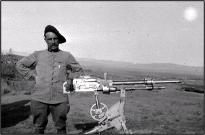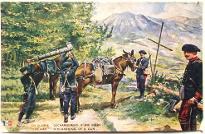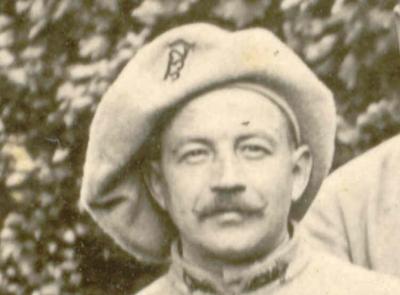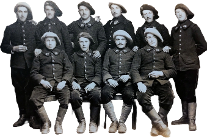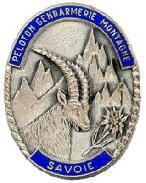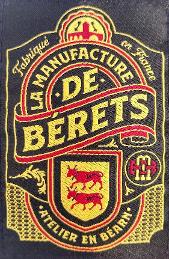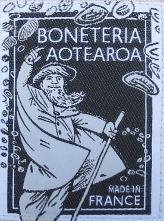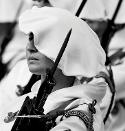The béret Chasseurs
Alpins (Alpine Hunter's beret), typically referred to as ‘Tarte’
(‘Pie’), is a large beret worn by the French mountain troops since 1891. Copied from the Pyrenean shepherds, the tarte became regulation uniform in 1891 after the French Government
created 12 specialized mountain battalions in 1888, feeling threatened after
Italy created 6 Alpini regiments of mountain troops, positioned close to the
French border. Traditionally navy, these days black and covered with a
white cotton cover for winter wear, it is worn tilted on the left, the badge carried
on the right side. The beret was large enough to protect a good part of the body from rain and
snow during long sentries in the mountains and just as much protects the wearer
from the sun. During the First World War, Chasseurs Alpins were known to often
abandon the regulatory helmet to wear their tarte
during battle. The tarte
remains the prerogative of the mountain troops, although there are some other
units that are allowed to wear this beret: the Gendarmerie Nationale Haute Montagne (Military Mountain Police), legionnaires
of the Foreign Legion Engineering Regiment and the Mountain Artillery Troops.
The Originals - WW1 Replica's in Navy and Bleu Horizon
South Pacific Berets is proud to present two new "old"
berets: the exact, handmade, replicas of the original Tartes of 1888 and 1915.
In the early days, berets typically exceeded the later
formally sanctioned plateau (diameter) of 33.6cm. While officers often bought
their smaller "luxurious" berets privately, troops were issued berets
that came from a large number of suppliers - some traditional beret
manufacturers, others made by regular uniform makers in woven wool cloth,
typically consisting of 3 or 4 parts sewn together and measuring 36cm.
In July 1915, the French high command proposed to
replace the stiff, unpractical kepi of the infantry troops by a beret, similar
to the Chasseurs Alpins. General Joffre accepted but instantly, the Chasseurs formed a
protest movement, wanting to maintain the monopoly of their berets. General Joffre accepted their (loud) concerns and changed
from berets to side caps, but meanwhile, several thousand berets were issued in
the standard WW1 uniform colour 'bleu horizon' (it was reasoned that in the
flat lands of Northern France and Flanders, the light blue uniforms would be
perfect camouflage against the horizon).
Despite a relatively short production, the light blue beret
became very popular, and many soldiers wore it until the end of the war and
after.
Now available at South Pacific Berets in a limited number,
exact replica's of these illustrious berets, or Tartes, in navy and 'bleu
horizon' in sizes 58 - 64. 36cm, 100% wool fitted with the traditional
unbleached cotton lining and size-stamped. The navy models come with a replica of the traditional badge
of the Chasseurs' hunting horn in daffodil (Chasseur slang for 'yellow') in
felt (with an iron-on backing).
Foulards Alpin Auloronesa - Universel
Boneteria Auloronesa
is a small, artisan company based in the historical Béarnaise city of Orthez in the French Pyrenees and the only
manufacturer to make berets following the traditional, pre-Industrial
Revolution method. These berets are fitted
with a liguette for easy adjustment of
size and available in black and a range of colours.
First Nation Australia - Universel
Foulards Alpin Aotearoa - Universel
The Boneteria Aotearoa
label is found only in the world's best quality, most comfortable berets.
These
berets are made by Boneteria Auloronesa in Oloron Sainte Marie, the birthplace of the beret
in the French Béarn. The Aotearoa Foulards
Alpins are made of the softest merino wool, fitted with a liguette for easy adjustment of size and
available in black and a range of colours.
Couvre Béret Blanc
– Winter Beret Cover
These Couvres Béret Blanc / Winter Beret Covers are the genuine winter beret covers as used by the Chasseurs Alpins for winter warfare. Original surplus in good (and clean) used condition at $14.80 (in combination with any beret purchase).
Insigne 6e Bataillon de Chasseurs Alpins
These polo shirts are part of the genuine uniform of the
Gendarmerie Haute Montagne (and it is not recommended to wear this shirt in
France if you are not an officer of the Gendarmerie).
The 500 grams polo is constructed from a unique, thick
poly/cotton fabric with excellent insulating and moisture absorption properties.
Velcro tabs on each arm and the chest allow for rank and emblem attachments
(but can be easily removed). Great for outdoor enthusiasts and casual enough
for everyday use - just not in France.
